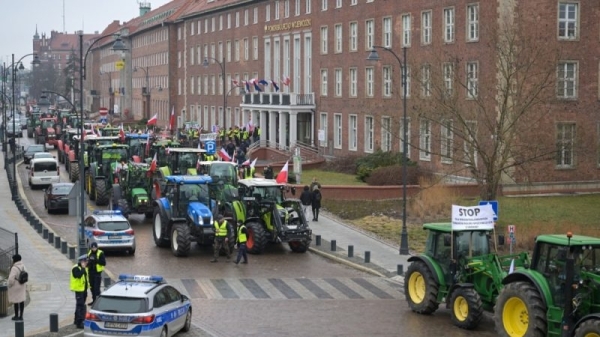Polish farmers resume national protests against food imports from Ukraine

Thousands of tractors took to the Polish streets in a huge nationwide demonstration on Friday (9 February) as local farmers, inspired by their colleagues from other EU countries, resumed their protest against the European Green Deal and the imports from Ukraine.
Polish farmers blocked with their tractors some 260 major roads across the country. They were joined by truckers, beekeepers, and foresters in the protest, supported by nearly all the farmers’ unions in the country.
“We oppose restrictions that the European Green Deal would impose on us and the influx of low-quality Ukrainian food to Poland under the liberalised EU trade rules,” an apple grower from central Poland, who did not participate in the protests due to logistical reasons but supports them, told Euractiv.
On 31 January, the European Commission renewed the suspension of import duties and quotas on Ukrainian exports to the EU for another year, until 2025, while reinforcing protection for sensitive EU agricultural products.
The protection mechanism failed to satisfy the farmers, who believe it is too weak compared to the needs.
Ukrainian food problem
Poland was one of the countries most affected by the introduction of the so-called solidarity corridors to facilitate food exports from Ukraine.
Instead of transiting further, much of the Ukrainian produce is stuck on the Polish market, causing a decline in the demand and prices for local Polish production.
This included Ukrainian grain and flour, but also poultry, eggs, sugar, milk, frozen soft fruit and even apple juice, of which Poland is the second largest exporter, after China.
“We see the solidarity corridors having failed, with Ukraine using the opportunity and exporting its agri-food production to the EU markets, which are attractive for Kyiv,” Jacek Zarzecki of the Federation of Agricultural Producers Union told Euractiv.
Earlier this week, Deputy Agriculture Minister Michał Kołodziejczak, who supervised in person the controls of Ukrainian food at the Polish border, reported that the batches of mouldy frozen raspberries, as well as sugar “of strange smell, to say the least”, were supposed to enter the country.
After the control, they were returned to Ukraine, Kołodziejczak wrote on X.
The unilateral import ban on Ukraine foods will remain in place until a better solution is found, Agriculture Minister Czesław Siekierski announced earlier this week. Many farmers and political forces, including the far-right Confederation party, call for the embargo to be expanded to other types of products.
Green Deal-related concerns
The Polish farmers also protest against the provisions to be introduced under the European Green Deal, which they say will largely complicate the production.
Zarzecki pointed to the regulation on greenhouse emissions from agriculture and enhancing the norms on animal welfare, “ the demands that are not followed by any support for the farmers, including financial support”.
The EU executive also proposed allowing EU farmers to make use of derogations for the year 2024 from Common Agricultural Policy rules obliging them to keep certain areas non-productive and reduce the use of pesticides. But for Polish farmers, it is far too little.
The Commission has launched a strategic dialogue on the future of European agriculture, which Zarzecki called “an empty promise”.
“A reckoning must come to the European Commission. EU institutions must withdraw from all regulations harmful to agriculture that are to be introduced under the European Green Deal,” he told Euractiv.
Visegrad coordination
The protests may get regional soon, as Slovak farmers have announced they are ready to join the protest and cooperate with farmers from their Visegrad country neighbours against “EU green fanaticism”.
The Agrarian Chamber of the Czech Republic called on farmers across Europe to take joint action and will discuss the coordination of pan-European protests at a meeting of the Visegrad Group (Czech Republic, Hungary, Poland and Slovakia) organisations on 12-13 February in Poland.
Polish farmers had put protests on hold until March, during the ongoing talks with the government. Asked by Euractiv what prompted them to resume the demonstrations, Zarzecki said the farmers had accumulate too much bitterness and disappointment, and also pointed to the upcoming sowing season.
“The protests would reinforce if there is no clear declaration by Commission President [Ursula] von der Leyen on changes in the CAP,” Zarzecki told Euractiv. He added that the policies by former Vice-President for the Green Deal, Dutchman Frans Timmermans, “have completely failed and the Commission must now deal with it”.
Government wants Wojciechowski’s removal
Meanwhile, calls are growing in Poland for the resignation of EU Agriculture Commissioner Janusz Wojciechowski.
Wojciechowski did not attend Wednesday’s debate in the European Parliament on empowering farmers and rural communities, which was criticised by numerous MEPs.
Polish Defence Minister Władysław Kosiniak-Kamysz, who is also the head of the agrarian Polish People’s Party (PSL, EPP), blamed the Polish commissioner for the farmers’ protests, pointing to him as the one behind the latest reform of the Common Agriculture Policy.
“There is a person in Europe who united all European and Polish farmers against the reform he himself proposed,” Kosiniak-Kamysz told the Polish parliament, calling for Wojciechowski’s resignation.
Jarosław Kaczyński, leader of the nationalist PIS party which had been in power until last year and sent Wojciechowski to Brussels in 2019, was not eager to defend his party’s nominee.
Kaczyński said he would call Wojciechowski and ask him to resign but cautioned that he had “no impact on whether he continues to be commissioner or not”.
It is not yet known whether the Polish government would demand that the Polish commissioner be removed.
The demand by Kaczyński is “incomprehensible,” Zarzecki told Euractiv, citing the upcoming European elections in June, but also recalled that it was Wojciechowski who had stood alone in the Commission against the continuation of liberalised trade rules with Ukraine.
Read more with Euractiv




